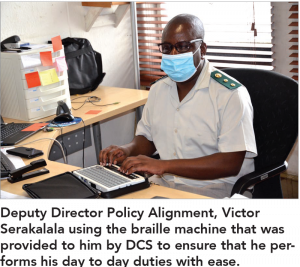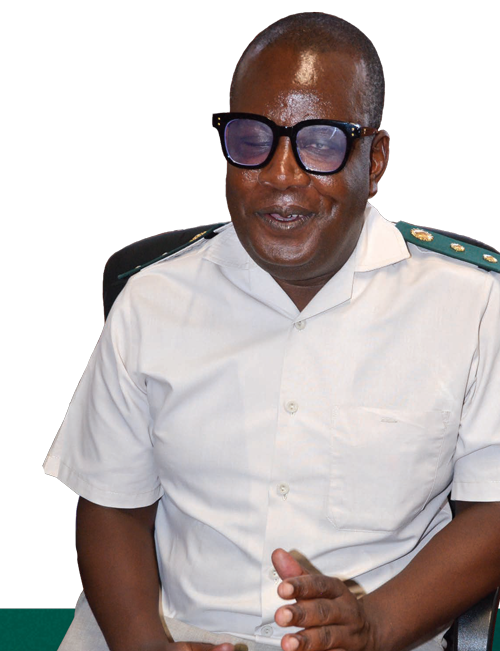 Persons with disabilities represent a pool of motivated and talented people in the labour market who are unfortunately under- utilized. Mr Victor Serakalala is a Deputy Director: Policy Alignment at Head Office who joined the DCS 15 years ago. He was born a visually impaired child in the deep rural area called Khomele, in Limpopo. With the right skills, training and technology visually impaired persons are found working in most industries.
Persons with disabilities represent a pool of motivated and talented people in the labour market who are unfortunately under- utilized. Mr Victor Serakalala is a Deputy Director: Policy Alignment at Head Office who joined the DCS 15 years ago. He was born a visually impaired child in the deep rural area called Khomele, in Limpopo. With the right skills, training and technology visually impaired persons are found working in most industries.
Mr Serakalala says his visually impairment is congenital as his mother was also blind. “I was born visually impaired and raised by a blind mother, so my entire life was sort of characterised by blindness,” said Serakalala. Despite this fact he grew up playing with other kids in the village as a normal child and did not see the challenge back then until he had to go to school. While others went to local schools he had to go to a special school that was far from where he stayed. He attended the Special School for the Blind situated in Ga-Chuene next to Polokwane. Mr Serakalala’s educational attainments include studies in public relations, international relations, politics, policy development and administration.
Serakalala joined the Department of Correctional Services (DCS) at a crucial time when the White Paper on Corrections had just been approved and he took on the responsibility of aligning the DCS’s policies with its new vision. Explaining about his role, he said that the white paper was a long term policy that had to be implemented within 20 years. The process of implementation needed to be aligned with the vision expressed by the white paper.
His previous work experience comprised of employment in Trade Unions, South African Police Services (SAPS) and the South African National Council for the Blind (SANCB). He said some of the best moments of his life he owed to SANCB when he did his advocacy work and later worked as their public relations officer.
The approved DCS Disability Friendly Recruitment Strategy clearly summarises the intention and willingness of the Department in attracting and retaining qualified people with disabilities. This does not only mean commitment to increase employment of and participation by persons with disabilities in work activities but also the responsibility of the Department as an enabler to ensure reasonable accommodation and suitable working environment for this labour force. The aim of the strategy is to set up system and processes that will ensure that the Department meets the required 2% of disability equity targets.

Although it is not always the case in many institutions, Mr Serakalala said he was fortunate to work under a manager that understands the situation and challenges of visually impaired persons. He said the Department gave him all the work resources he needed. “They gave me a computer with a program called Job Access with Speech (JAWS). Every time when I have to read emails or anything from the computer the program reads the screen either with a text-to-speech output or by a refreshable braille display, this way I am able to listen and respond to emails,” he explained. Serakalala also receive external assistance from contract based employees who assist him when he faces difficulties completing some tasks such as filling in forms in writing. He said he is grateful that currently there are no barriers that make him feel uncomfortable at work.
Technology and innovation can play a pivotal role in helping persons with disabilities to execute their duties with minimal challenges. Mr Serakalala agreed that technology is an enabler for persons with disabilities. He said people like him who have impaired vision required going to refreshment courses that will introduce them to current technology. “For us technology is very crucial because we depend on a voice or text-to-speech programs to have an understanding of what is happening around us. He said technology assists the blind and they adjust very easily if the innovative world is availed and opened to them. He wishes that technology can grow even faster so that people like him can be more accommodated in the work place and socially.
He encouraged the Department to create an on-going awareness throughout the year on persons with disabilities. He emphasized the importance of disability campaigns that target managers and employers towards facilitating the provision of reasonable accommodation and resources for persons with disabilities.
